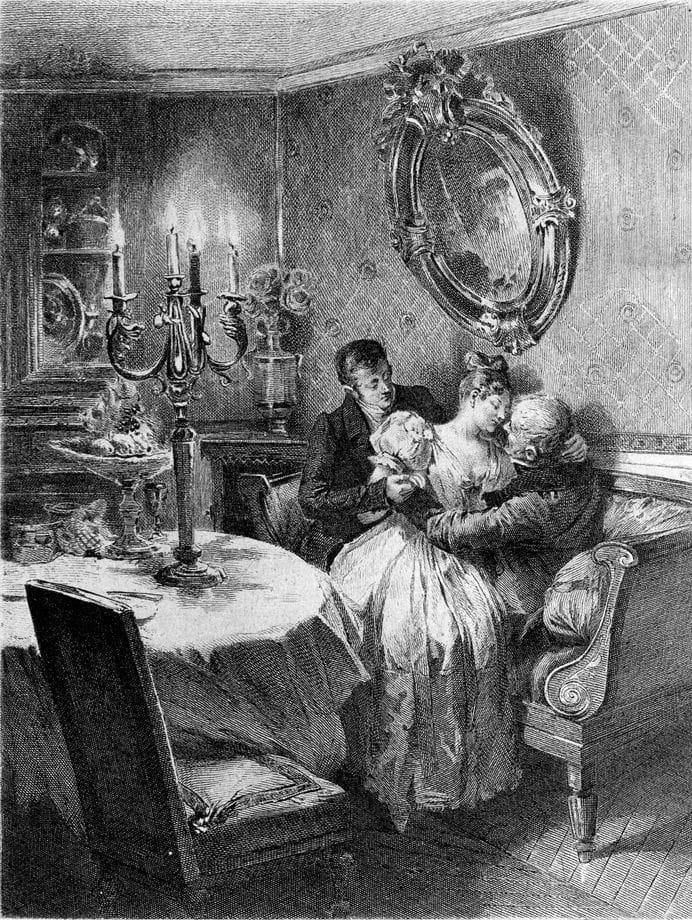Honoré de Balzac is an important author who developed French literature and the “classical novel” technique, which presents characters in a consistent manner, follows a logical order and deals with a wide range of social life. Balzac considered one of the pioneers of the “Realism” movement; While reflecting the inner world of the heroes in detail in his works, he did not break away from reality and also discussed the class distinction in the French society of the period and the decay in family life. Realism, a literary movement that adopts the way of telling reality as it is, emerged especially from the positivism philosophy of philosopher Auguste Comte, and Gustave Flaubert, Stendhal and Honoré de Balzac also benefited from the realism movement in their works.
The most critical characters of the book are undoubtedly Father Goriot, Eugène de Rastignac, Madame Vauquer, Vautrin, Madame de Beauséant and the daughters of Father Goriot. Father Goriot is a 69-year-old noodle master. He became rich during the times when wheat was popular, and after the death of his wife, he became very attached to his two daughters, Anastasie and Delphine, and gave them everything they wanted. After retiring and ensuring that his daughters had the marriages they wanted, he settled in Madame Vauquer’s old boarding house and started living there. There is a clear difference even between the rooms and floors of this hostel. Although Father Goriot’s financial situation was good at the beginning, his money gradually decreased and he had to give up his old room in the hostel and his arbitrary needs. We can understand that Father Goriot’s condition has deteriorated from the attitude of Madame Vauquer and the other people in the hostel towards him, from the fact that he moved from the floor where the rich people stayed and moved to a room where he paid less rent, from the fact that he gave up his barber who came every week, and from the fact that Father Goriot gradually weakened and his face became pale.
Madame Vauquer is a money-grubbing, stingy and widowed woman. She is the owner of the Vauquer Pension and secretly wants to be like the nobility. When Father Goriot first came to the hostel, she was impressed by the money he had and showed interest in him. However, when Father Goriot’s money ran out, she abandoned her plans to marry him and the great attention she showed him, and started addressing him as “Father Goriot” instead of “Monsieur Goriot”. While Father Goriot was living in poverty, his daughters married noble people and did not even look at their father. They dressed like the Paris nobles of the period and lived in rich mansions. The character Eugène comes from a middle-class family from the south. Although he was supposed to complete his law education in Paris, he entered the Paris salons thanks to his distant relative, Madam de Beauséant, and did his best to live like a nobleman, using women as a tool in this path. A father-son relationship began between him and Father Goriot, and their bond grew stronger.
Throughout the novel, Father Goriot suffers the punishment for raising his daughters incorrectly, but without realizing it, he wants to work even harder for them. He saw himself as inferior to them and raised them by providing every opportunity. “I continue my existence with my two daughters. “If they are in a good mood, if they are happy, if they are walking on their elegant carpets, what does it matter what I wear or where I sleep?” (p.126), “…I would sell the Father, the Son, and the Holy Spirit so that neither of my daughters would shed a single tear!” (p.145) he used the expressions. Father Goriot’s unrequited love for his daughters almost blinded him and caused people to pity him. Father Goriot’s incorrect upbringing of his daughters also showed itself in their marriages, and this time they began to spend their husbands’ money. His daughter Delphine summarized the situation best by saying, “Because of my poor father, we were used to getting everything we wanted.” However, the perception of the “father” figure as “giving his children everything they want” continues today and manifests itself in different ways. For example, in today’s private school concept, while parents pay a fortune for their children to receive a good education, they do not give them the attention, love and life lessons they really need; They feel at ease with the money they pay to private schools. When we look at the work “Father Goriot”, we see that a father figure who gives everything without limit leads to daughters who do not even deign to come to their father’s funerals. Therefore, we can say that a father who provides every opportunity is not the “ideal father”.
When we consider the character of Eugène, we encounter a character whose only passion is the ambition to rise. The scenes that Eugène encounters while trying to join the nobility show us the deterioration in the marriage structure of the period and relationships in which the concept of “love” is replaced by “betrayal”. As we understand from the book, especially at the time when the book was written, extramarital affairs were considered quite natural and we see that couples were aware of this. In the novel, both Madame de Beauséant and Madame de Restaud have relationships outside of marriage. Eugène also first showed interest in Madame de Restaud, and then fall in love with Madame de Nucingen. Over time, Eugène realized that this was not love, but what he experienced was his own passion. He was disturbed by Delphine’s obsession with money and her indifference towards Father Goriot. At the end of the book, both Father Goriot and Eugène realize the evil of the world and understand that people act for money and their own ambitions. At the end of the book, only Eugène, Bionchan and the priest attended Father Goriot’s funeral.
Balzac’s work “Father Goriot” shows the place of passions on people and society by dealing with elements such as love, money, betrayal and virtue. The main conflict in the book is the conflict of wealth and poverty. While the novel reflects the misery in the hostel, on the other hand, it reflects the magnificent houses and high society life that Eugène goes to. The novel is not only about the tragedy of Father Goriot, but also the power of money in social life. As in most novels, there are similarities in the plot of the book with Balzac’s life, for example, Balzac’s increasing debts like Eugène, his relationship with Madame Hanskay, a Ukrainian countess, and his internship as a lawyer. The book “Father Goriot” and Stendhal’s “Red and Black” are among the works that best reflect the France of the period, the abundance of extramarital affairs and human passions. To summarize, even though centuries have passed, society is experiencing various deteriorations, people still act with their ambitions, money is still seen as one of the greatest elements of power in society, and the number of young people like Eugène is increasing.
BIBLIOGRAPHY Ali Yağlı (2017). The Family and Social Drama in Father Goriot of Balzac.Journal of Turkish Studies
Balzac, Honoré de, (2022), Goriot Baba, İstanbul, Türkiye İş Bankası Kültür Yayınları
Klasik Roman Nedir Hakkında Bilgi Örnekleri Kısaca Özet https://www.edebiyatfakultesi.com/roman/akimlara-gore-romanlar/klasik-roman
Kudret, Cevdet, Örneklerle Edebiyat Bilgileri, İnkılâp Yayınevi, 2003
Kübra Nalbat, Honore de Balzac’ın “Goriot Baba Kitabının 19. Yüzyıl Batı Paradigması Çerçevesinde Değerlendirilmesi, Ankara Yıldırım Beyazıt Üniversitesi, İnsan ve Toplum Bilimleri Fakültesi Felsefe Bölümü, 19.Yüzyıl Felsefesi Final Ödevi


